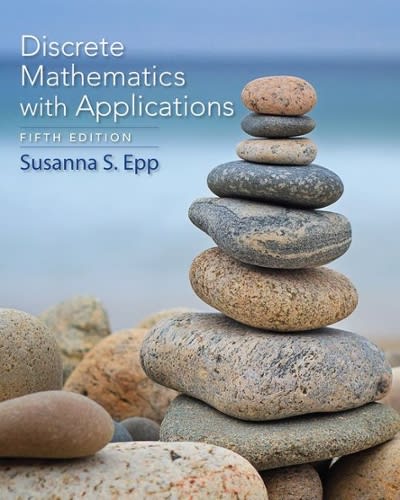Question
Suppose you want to see if there are gender differences in exercising at Community College. A random sample of 150 Community College students are asked
Suppose you want to see if there are gender differences in exercising at Community College. A random sample of 150 Community College students are asked three questions:
What is your gender? (Male/Female)
Do you exercise regularly? (Yes/No)
If you exercise regularly, how many minutes was your last workout?
First, you want to investigate if the proportion of all Community College students who exercise regularly is greater than 50%. The correct set of hypotheses is
a)H0: pexercise = 0.50 , H1 : pexercise 0.50
b)H0 : pexercise = 0.50 , H1 : pexercise < 0.50
c)H0: pexercise = 0.50 , H1 : pexercise > 0.50
d)H0 : pexercise = 0.50 , H1 : pexercise 0.50
e)H0 : pexercise = 0.50 , H1 : pexercise < 0.50
f)H0 : pexercise = 0.50 , H1 : pexercise > 0.50
g)H0: pexercise 0.50 , H1 : pexercise = 0.50
h)H0: pexercise < 0.50 , H1 : pexercise = 0.50
i)H0: pexercise > 0.50 , H1 : pexercise = 0.50
j)H0 : pexercise 0.50 , H1 : pexercise = 0.50
k)H0 : pexercise < 0.50 , H1 : pexercise = 0.50
l)H0 : pexercise > 0.50 , H1 : pexercise = 0.50
1.Next you want to find out if the proportion of all Community College females who exercise regularly is different from the proportion of all Community College males that exercise regularly. The correct set of hypotheses is
a)H0 : pfemale =pmale , H1 : p female pmale
b)H0 : pfemale =pmale , H1 : p female <pmale
c)H0 : pfemale =pmale , H1 : p female >pmale
d)H0 :pfemale =pmale , H1 :pfemale pmale
e)H0 :pfemale =pmale , H1 :pfemale <pmale
f)H0 :pfemale =pmale , H1 :pfemale >pmale
g)H0 : pfemale pmale , H1 : p female =pmale
h)H0 : pfemale <pmale , H1 : p female =pmale
i)H0 : pfemale >pmale , H1 : p female =pmale
j)H0 :pfemale pmale , H1 :pfemale =pmale
k)H0 :pfemale <pmale , H1 :pfemale =pmale
l)H0 :pfemale >pmale , H1 :pfemale =pmale
2.Circle TRUE or FALSE on each.
i. A p-value can be negative. TRUEFALSE
ii.A standardized statistic can be negative. TRUE FALSE
iii.The p-value for a two-sided test will be about twice as large as the corresponding p-value for a one-sided test. TRUEFALSE
iv. We can run a hypothesis test to determine if is larger, smaller, or different than some value. TRUE FALSE
3.Food inspectors inspect samples of food products to see if they are safe. This can be thought of as a hypothesis test where H0 : the food is safe, and H1 : the food is not safe.
i.Describe a type I error for this situation (not just a general definition):
ii. Describe a type II error for this situation (not just a general definition):
iii.If you are a consumer, which type of error would be the worst one for the inspector to make, the type I or type II error? Why?
Step by Step Solution
There are 3 Steps involved in it
Step: 1

Get Instant Access to Expert-Tailored Solutions
See step-by-step solutions with expert insights and AI powered tools for academic success
Step: 2

Step: 3

Ace Your Homework with AI
Get the answers you need in no time with our AI-driven, step-by-step assistance
Get Started


